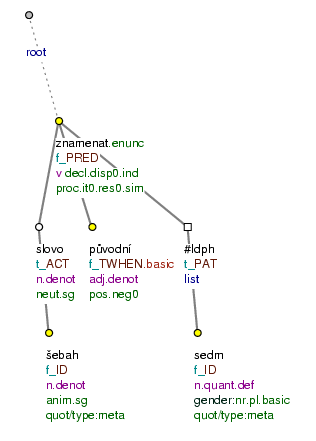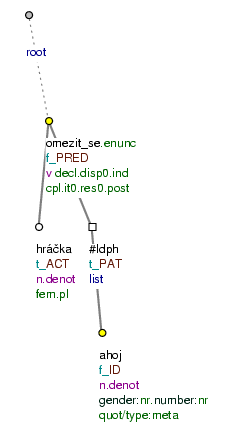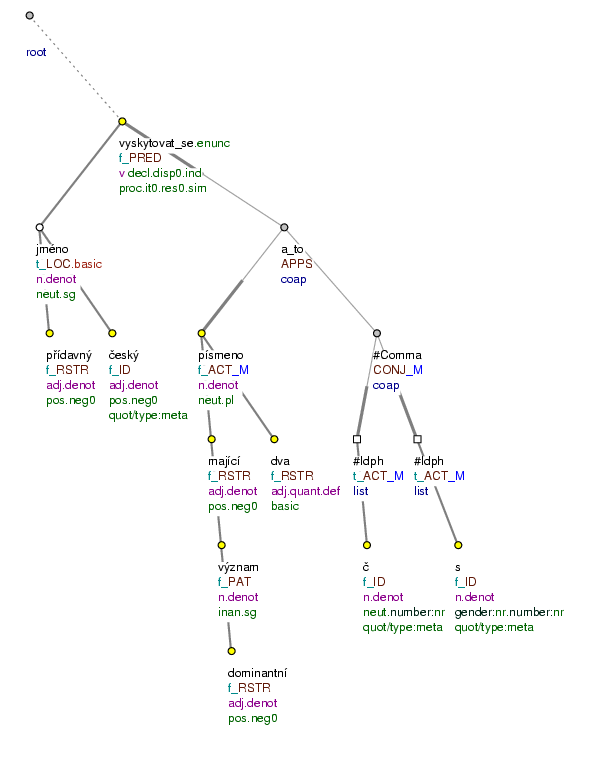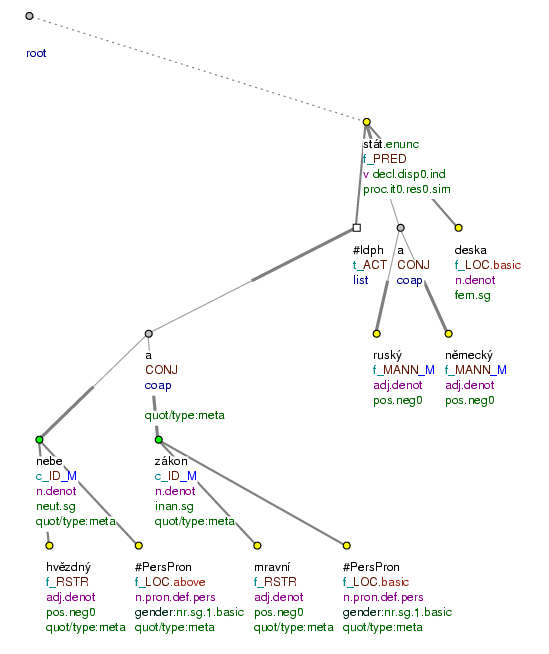Meta-usage, expressions used metalinguistically, means expressions in which the words are not used in the usual way, the words themselves being under discussion, in respect of their meaning or their phonetic or graphic form.
Meta-usage of a word (or phrase or even a whole sentence) is generally introduced by a noun signalling that the common meaning of the word or words is not involved: nápis (=notice), slovo (=word), text (=text), otázka (=question), označení (=identification), pojem (=concept), věta (=sentence), výraz (=expression), výrok (=statement), význam (=meaning) etc. (some of these nouns can also introduce direct speech; see Section 3.1.2, "Direct speech as modification of a noun"). Meta-usage is also common in the case of the verbs: znamenat (=to mean), značit (=to designate), označovat (=to mark), psát (=to write), vyslovovat (=to pronounce) etc.
At nodes representing the respective constituents of metalinguistically used expressions, indicated graphically by quotation marks, the value meta is entered in the attribute quot/type. On this, see Section 19.1, "Text within quotation marks".
Meta-usage is represented as an identification structure (see Section 8.1.3, "Identification structure").
On the boundary between expressions used metalinguistically and direct speech, see Section 3.3, "Borderline cases between direct speech and meta-usage".
Examples:
Hráčky se omezí na {#Idph.PAT} " ahoj.ID ". (=The players restrict themselves to a "hello".) Fig. 8.169
Slovo šebah.ID znamená původně {#Idph.PAT} sedm.ID (=The word "shebah" originally means "seven".) Fig. 8.170
V přídavném jménu "český.ID se vyskytují dvě písmena mající dominantní význam, a to {#Idph.ACT} " č.ID " a {#Idph.ACT} " s.ID ". (=In the adjective "český" (="Czech") two letters occur which have a dominant meaning, i.e. "č" and "s".) Fig. 8.171
{#Idph.ACT} "Hvězdné nebe.ID nade mnou a mravní zákon.ID ve mně" stojí rusky a německy na desce. (="A starry sky above me and a moral law within me", it says in Russian and German on the record.) Fig. 8.172
Germanismus klika.ID se užívá ve významu štěstí.ID a znamená také {#Idph.PAT} držadlo.ID k otvírání dveří. (=The germanism "klika" is used to mean good luck and it also means a door handle.)
Billboard s nápisem "Vpřed.ID " (=A hoarding with the inscription "Forwards".)
cedule s nápisem "Romy neobsluhujeme.ID " (=A notice with the inscription "We do not serve Romanies".)
Vyznání "miluji.ID tě" i slovo odchod.ID lidé zprofanovali. (=People have corrupted the confession "I love you" and the word "departure".)
Za výchozí význam považuje {#Idph.PAT} " hák.ID , hákovitý předmět.ID ".(=He/She considers the original meaning to be "a hook", "a hook-like object".)
s významem tleskat.ID (=meaning "to clap".)
Výrobky obsahující freony budou podle zákona zřetelně opatřeny textem "Výrobek obsahuje.ID látky ničící ozónovou vrstvu Země." (=Products containing CS gases will by law be clearly marked "This product contains matter damaging to the Earth's ozone layer".)
Figure 8.170. Meta-usage

Slovo "šebah" znamená původně "sedm". (=lit. Word "shebah" means originally "seven".)


